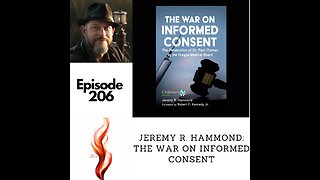Premium Only Content

Episode 199 - Joe Wolverton: Drinking From The Source
Joe Wolverton returns to And If Love Remains! @teacherofliberty
Joe's interview with Dr. Jonathon Scott: https://www.youtube.com/watch?v=rk4Xmiap3XQ
#liberty #education
Show Notes:
- Discussion of the podcast "And If Love Remains" hosted by Mike Leavitt
- Guest Dr. Joey Wolverton discusses the importance of understanding the principles the Founding Fathers based the country on
- They talk about various philosophers and thinkers that influenced the Founders like Algernon Sydney, Niccolò Machiavelli, Hugo Grotius
- The show emphasizes reading original sources from Sydney, Grotius, Plutarch etc. to truly understand the foundation of America
- They criticize mainstream conservative pundits for lack of depth on founding principles
- Dr. Wolverton issues a "homework assignment" to read Thomas Gordon's "Independent Whig" letters
- Discussion of how reading great works impacts you by "marinating" in the ideas
- The necessity of sacrifice for timeless principles, using examples like Algernon Sydney and the Scottish Covenanters
Summary:
Mike Leavitt, host of the podcast “And If Love Remains,” interviews guest Dr. Joey Wolverton about the importance of understanding and upholding the core principles that influenced the Founding Fathers. They emphasize that simply claiming affinity for the Constitution and Founders is meaningless without actually studying the sources and thinkers they drew from.
Dr. Wolverton points out names in the index of The Federalist Papers like Algernon Sydney, Hugo Grotius, and Plutarch, challenging listeners about why these names were so influential. He stresses the need to understand the philosophy in sources like Sydney’s Discourses Concerning Government instead of just reading commentary about them. The hosts criticize mainstream conservative pundits for lack of depth on the actual foundations of the American republic.
A core message is that only through reading original sources can citizens truly grasp the principles that guided the Founders. Dr. Wolverton says that despite unprecedented access to information now, too many settle for “drinking downstream” instead of making the effort to go directly to the source. He uses the metaphor of a mountain spring - one can picnic nicely beside the downstream flow, but must climb up to taste the pure, cool water bubbling straight from the earth.
Similarly with works like Grotius’ writing on war and peace - reading just 10 pages would give more meaningful context for current events than anything modern commentators are saying. Dr. Wolverton issues a “homework assignment” for listeners to read Thomas Gordon’s “Independent Whig” letters from the 1720s and experience how they still perfectly describe political realities today.
They emphasize how profound works change you through “marinating” deeply in the contained ideas over time. This helps explain why the Founders could just reference authors like Sydney or Grotius without explanation - their entire culture was steeped in studying such thinkers. Loss of this shared context handicaps modern citizens trying to uphold the republican experiment.
Sacrificing for timeless principles is another key theme. Using examples like Algernon Sydney and the Scottish Covenanters, they highlight how standing firmly for truth - even to death - resonated powerfully with the Founding generation. It’s not just what great minds wrote, but how the authors lived and died that made them beloved exemplars to guide America’s founders through turmoil. Mike Leavitt concludes by saying if modern Americans also read what the founders read, perhaps they would rediscover the courage to do what the founders did.
-
 1:35:44
1:35:44
And If Love Remains
9 months agoEpisode 206 - The War on Informed Consent: Jeremy R. Hammond on Vaccine Policies and Parental Rights
593 -
 56:02
56:02
Sarah Westall
9 hours agoBiohacking & Peptides: Weight loss, Anti-Aging & Performance – Myth vs Reality w/ Dr. Diane Kazer
41.4K14 -
 11:22
11:22
Bearing
19 hours ago"Anxious & Confused" Federal Workers FREAK OUT Over DOGE Efficiency Email 💥
56.3K62 -
 1:31:20
1:31:20
Flyover Conservatives
1 day agoUS STOCK MARKET: Sinking Ship - Dr. Kirk Elliott; How I Fought Back Against Woke Schools & Stopped Gender Bathrooms - Stacy Washington | FOC Show
62.8K1 -
 1:08:09
1:08:09
Donald Trump Jr.
13 hours agoFBI Dream Team, Plus Taking Your Questions Live! | Triggered Ep.219
202K270 -
 7:32:37
7:32:37
Akademiks
12 hours agoDrake and PartyNextDoor '$$$4U' Album Sells 250K first week. BIG AK IS BACK.
120K18 -
 3:12:08
3:12:08
MyronGainesX
12 hours ago $32.10 earnedDan Bongino Named FBI Deputy Director, Trump Meets Macron, And More!
97.5K29 -
 3:12:31
3:12:31
vivafrei
11 hours agoBarnes Live from Seattle - Defending Benshoof in a Case that is CRAY CRAY!
155K49 -
 2:12:12
2:12:12
Robert Gouveia
12 hours agoLiberals EXPLODE over Elon's Email; Lawsuits FLY; Sanctions?? Congrats Dan!
116K40 -
 1:33:36
1:33:36
Redacted News
12 hours agoBREAKING! PUTIN LAUNCHES MASSIVE OFFENSIVE IN UKRAINE AS EUROPEAN LEADERS PUSH FOR MORE WAR
193K266